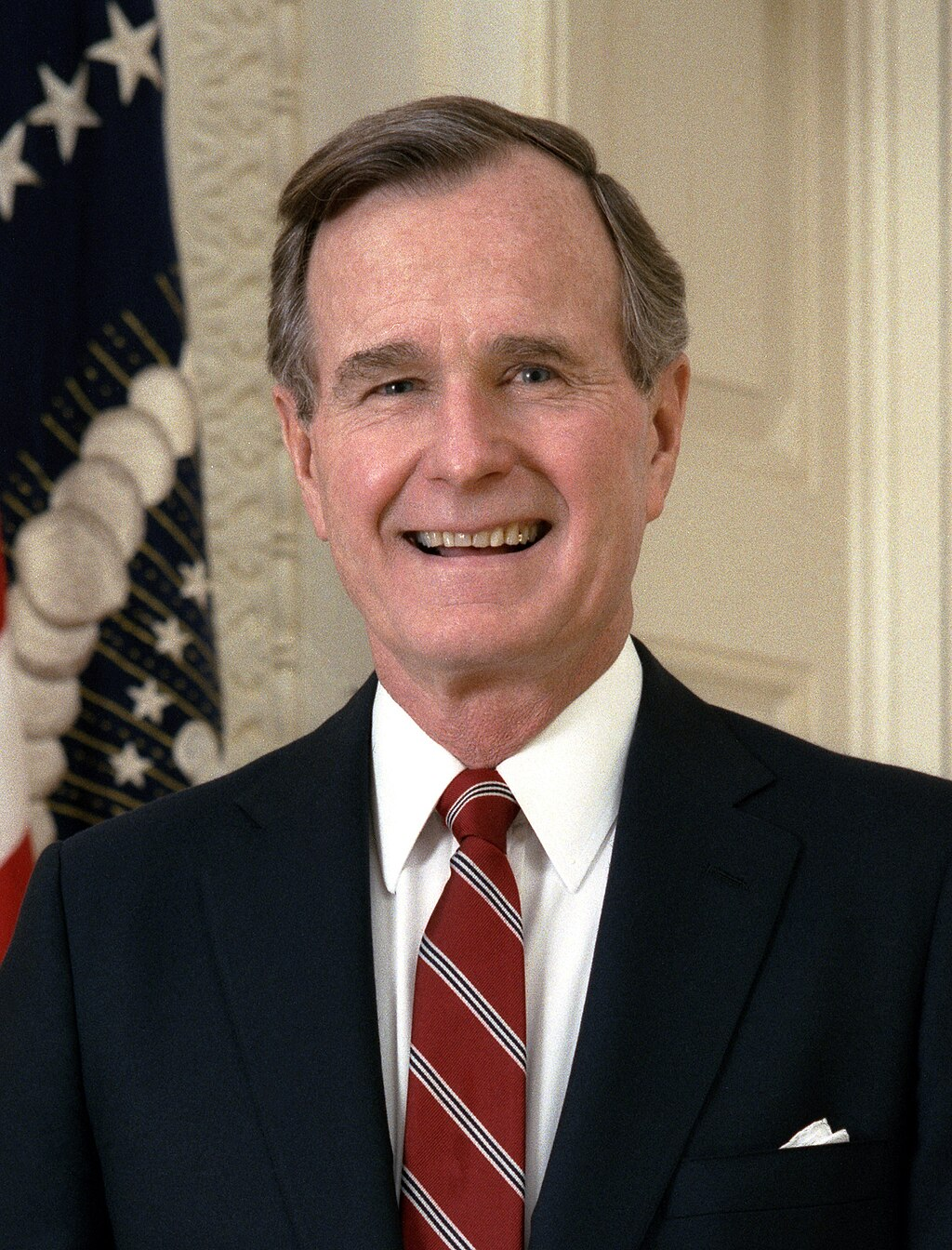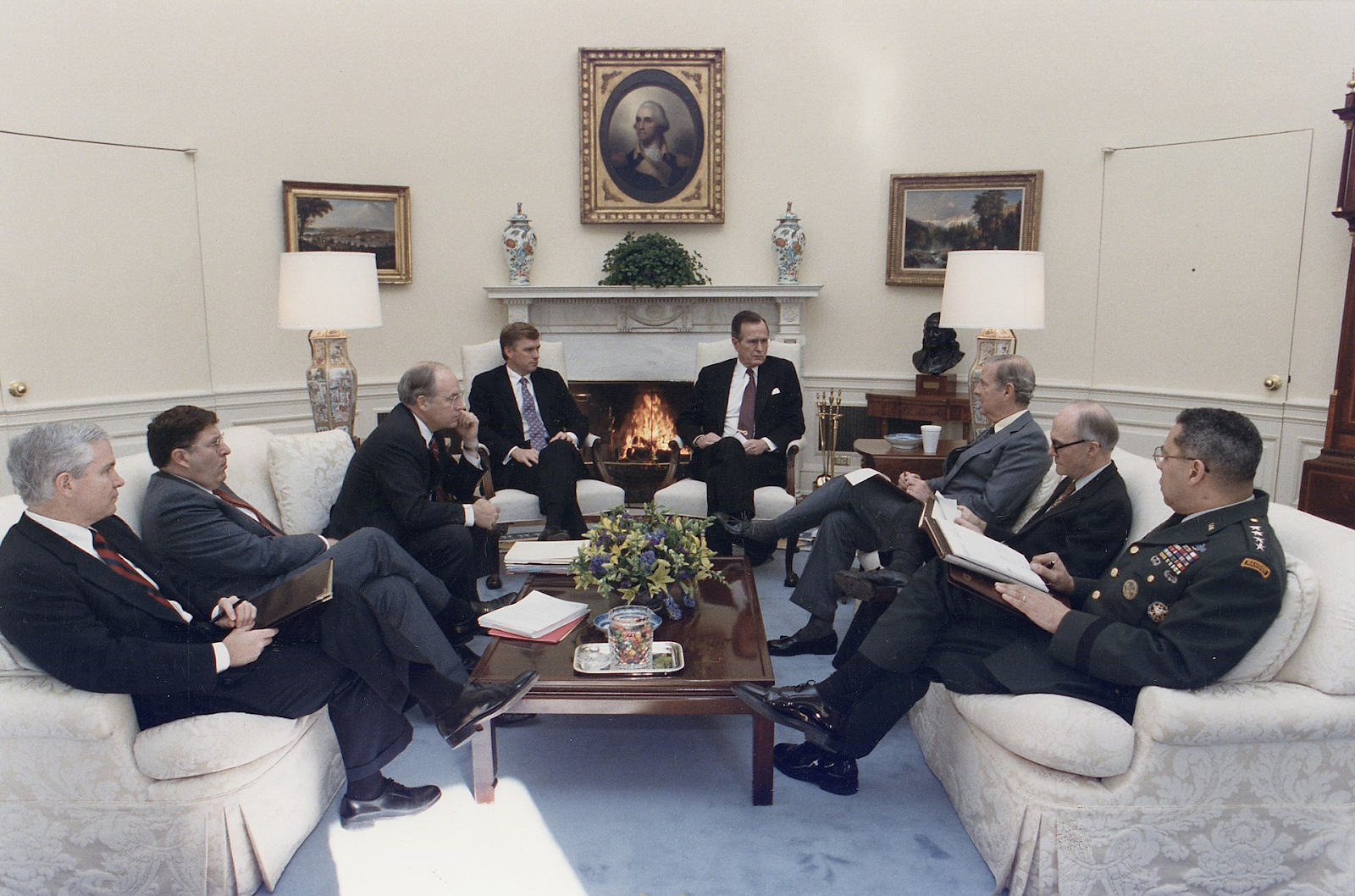George H. W. Bush: A Statesman in Service of Country
George Herbert Walker Bush, the 41st President of the United States, occupies a unique and often underappreciated place in American history. A man of quiet confidence and institutional loyalty, Bush led during a time of profound global transformation, guided by a belief in service, prudence, and diplomacy. His presidency (1989–1993) marked the final chapter of the Cold War and the uncertain birth of a new world order—events that he managed with strategic restraint and measured vision. To understand his legacy, one must trace not only his presidential years but also the lifetime of service that shaped his approach to leadership.

A Life Steeped in Service
Born on June 12, 1924, in Milton, Massachusetts, Bush came from a prominent family—his father, Prescott Bush, was a U.S. senator. Yet George H. W. Bush did not rely solely on inherited privilege. At 18, shortly after the attack on Pearl Harbor, he became the youngest Navy pilot in the United States. He flew 58 combat missions during World War II, surviving a harrowing incident when his plane was shot down over the Pacific. That sense of duty and perseverance never left him.
After the war, Bush attended Yale University, where he excelled academically and captained the baseball team. He quickly relocated to Texas, venturing into the oil industry independently and setting himself apart from the East Coast establishment. But the call to public service returned. By the mid-1960s, Bush entered politics. This initiative launched a congressional career that would become the foundation for decades of service in nearly every major institution of American government.
Building a Foreign Policy Résumé Few Could Match
Before assuming the presidency, Bush held an array of posts that few modern politicians can match: U.S. Representative, Ambassador to the United Nations, Chair of the Republican National Committee during the Watergate era, U.S. Envoy to China at a pivotal moment in Sino-American relations, and Director of Central Intelligence. Each position sharpened his understanding of diplomacy, institutional processes, and global affairs.
As vice president under Ronald Reagan (1981–1989), Bush became deeply involved in both foreign and domestic policy, developing relationships with world leaders and providing a more measured, analytical counterpart to Reagan’s rhetorical style. He was not an ideologue; he valued relationships and the long term over headlines and confrontation.
Leading in a Time of Global Transition
When Bush became president in January 1989, the world was on the cusp of seismic change. Within a year, the Berlin Wall fell. By 1991, the Soviet Union had dissolved. These events could have unleashed chaos. Instead, Bush worked quietly and skillfully with international allies and Soviet leaders, particularly Mikhail Gorbachev and later Boris Yeltsin, to ensure a peaceful transition. His restraint during the collapse of communism in Eastern Europe was deliberate. As historian Jon Meacham noted, Bush “chose not to dance on the Berlin Wall,” believing that diplomacy and stability mattered more than triumphalism.

Perhaps most defining was his leadership during the Gulf War. When Saddam Hussein invaded Kuwait in 1990, Bush swiftly assembled a broad, 34-nation coalition, sought and received congressional authorization, and launched Operation Desert Storm. The mission was narrowly focused: expel Iraqi forces from Kuwait. It succeeded in just six weeks, with minimal American casualties. Bush resisted pressures to push into Baghdad, wary of overreach and long-term instability, a judgment vindicated in hindsight.
Domestic Achievements and Political Risks
Domestically, Bush’s record was more complex. He championed the Americans with Disabilities Act of 1990, one of the most sweeping pieces of civil rights legislation since the 1960s. He also signed the Clean Air Act Amendments of 1990, which modernized environmental policy and introduced market-based mechanisms to reduce acid rain. These bipartisan accomplishments reflected his pragmatic conservatism.
Yet Bush paid a steep political price for his decision to break his 1988 campaign pledge, “Read my lips: no new taxes,” by agreeing to a budget deal to reduce the federal deficit. Economists and policy analysts often attribute this compromise to helping restore long-term fiscal discipline. But politically, it fractured his conservative base and contributed to his 1992 election loss to Bill Clinton.
Post-Presidency: Grace, Diplomacy, and Patriotism
Following his defeat, Bush largely withdrew from partisan politics, choosing instead to serve as an elder statesman. In his post-presidential years, he built a reputation for grace and generosity, often working with former rival Bill Clinton on disaster relief and humanitarian efforts. His humility, handwritten notes, and understated style became a model of civility in an increasingly polarized political landscape.
His final years were marked by the passing of his beloved wife, Barbara, in April 2018, and his own death just months later, on November 30, 2018. His funeral brought together political opponents and allies alike in a rare moment of national unity and reflection.
A Legacy of Quiet Leadership
Ideological crusades or fiery speeches did not define George H. W. Bush’s presidency. Instead, he led with caution, experience, and a profound sense of responsibility. His legacy is one of steadiness: a leader who believed in alliances, diplomacy, public service, and the virtue of placing country above self.
In an era increasingly marked by noise and division, Bush’s quiet strength—and his devotion to the institutions of American democracy—stands as a reminder that leadership is not always about dominance or drama. Occasionally, the truest mark of a statesman is knowing when not to act—and how to lead with dignity, patience, and vision.
References:
Meacham, Jon, Destiny and Power: The American Odyssey of George Herbert Walker Bush. Random House, 2015.

